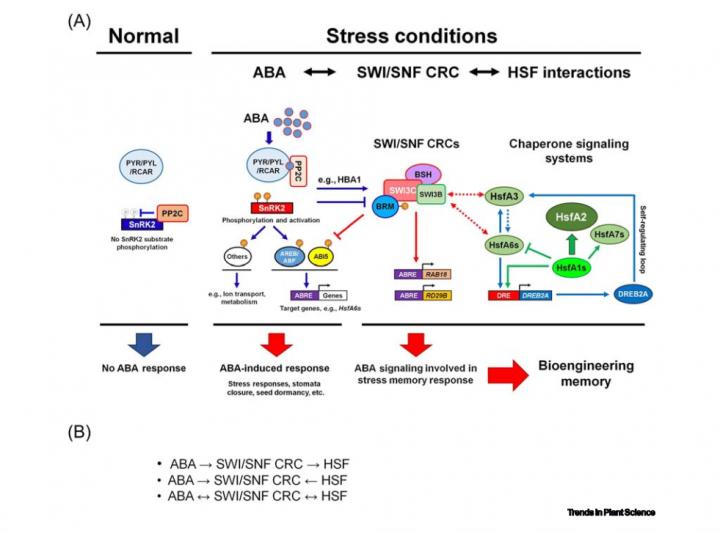The treatment aimed to increase the stress resistance of plants was proposed

Credit: FEFU press office
Scientists of Far Eastern Branch of the Russian Academy of Sciences (FEB RAS), Far Eastern Federal University (FEFU) and National Taiwan University comprehended state of the art scientific knowledge about plants stress response activated by unfavorable environmental factors. Researchers proposed ways to improve crop plants stress resistance by developing one’s heritable stress response memory which will allow preserving the stability of the yield obtained worldwide. A related review published in Trends in Plant Science.
International biotechnology teams have long been taking actions to boost plants resistance to major stressors provoking crop loss like heat, cold, lack of/ excess of light, drought/excess of moisture, as well as various combinations of these factors. However, current methods are developed with no full consideration of the stress response mechanisms based on different variants of intercellular communication in plant organisms.
Biotechnologists from FEFU, FEB RAS, and the National Taiwan University have scrutinized how the main mechanisms through which plant cells learn about the stressful situation and react to it — abscisic acid (ABA) signal subsystems and heat shock proteins — interact with each other. Scientists have pointed out that SWI/SNF proteins play an important role in the interaction between these subsystems., These proteins are responsible for remodeling of chromatin, i.e. the basis of chromosomes — the ones where the vast majority of inherited information is concentrated, and which are intended for its storage, realization, and transfer. Ultimately, SWI/SNF proteins may be involved in the formation of a plants stress memory. They were proposed for bioengineering treatment aimed to increase the stress resistance of plants.
‘SWI/SNF is a remodeling protein complex containing in all organisms whose cells have nuclei. This group of proteins is responsible for the way DNA is repackaged without changing its molecular structure. In plants, the complex is responsible for growth, development, reaction to stress and — along with ABA and heat shock proteins signal subsystems that it binds — for the stress memory formation. We studied scientific works related. Based on them, we proposed several ways to adjust the SWI/SNF chromatin-remodeling proteins, as well as the associated components of the signaling subsystems, with the goal to develop a memory about stress experienced by the plants of initial and subsequent generations. Thus, we are talking about the concept of plants “bioengineering memory”, which will increase plant resistance to stress’ Said Viktor Bulgakov, Doctor of Biological Sciences, Corresponding Member of the Russian Academy of Sciences, FEFU Professor, who devised the concept of the article published.
The scientist went on that the mechanism of plants memory about stress experienced and the transfer of the ‘memories’ from the first to the next generations is still a little-studied area, but research in this field is attracting great attention.
In the article, scientists warn of temperance, which is necessary in bioengineering manipulations with the stress tolerance of plants. All methods should be as close as possible to the natural adaptation of plants to stress.
‘For this, biotechnologists can use the most advanced genomic editing technologies. For example, the CRISPR-Cas9 method allows one to ‘tweak’ the function of the plant gene with no introducing alien information into the plant’s DNA. This means that in Russia it will be possible to completely abandon GMOs in the sense it understood traditionally. Actually, this is the purpose of our work carried out under the grant. In the USA, products created via CRISPR-Cas9 technology are recognized as indistinguishable from natural selection products’ Victor Bulgakov noted.
Scientists also urge to take into account the phenomenon of plants ‘memory’ when planning all subsequent experiments to improve plants stress resistance.
The hypothesis that traits acquired in one generation can be passed through to the next generations was first expressed by Jean-Baptiste Lamarck in the 19th century. At the beginning of the 20th century, this prompted USSR Academician Lysenko to try to grow wheat in an unsuitable climate. The consequences of the experiment were devastating. Later, the concept of heredity of acquired traits was considered with a reasonable degree of skepticism, until its popularity was revived several years ago by progress in the field of genomics and epigenetics.
It is now reliably known that the previous moderate impact may protect the plant from future stress or contribute to its acclimatization, which may persist until subsequent exposure. Thus, it is widely accepted that plants have the ‘memory’-like ability.
###
The research was supported by grants from the Russian Science Foundation (No. 18-44-08001) and the Ministry of Science and Technology of Taiwan (No. 105-2311-B-002-033-MY3 and No. 107-2923-B002-003-MY3).
Media Contact
Alexander Zverev
[email protected]
Related Journal Article
http://dx.



